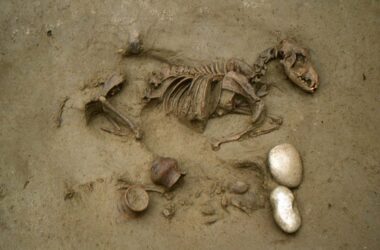Stone Age hunter-gatherers had children with farmers in Europe
Alamy Stock Photo
Researchers have discovered that Stone Age farmers who settled in Europe inherited a significant number of immunity genes from local hunter-gatherers. This suggests that the development of farming was not the sole reason for the increase in resistance to pathogens among early humans.
Previously, it was believed that ancient farmers had stronger immune systems compared to hunter-gatherers because they lived in densely populated areas and had closer contact with animals, which meant greater exposure to pathogens. As farming populations grew, it was thought that their immunity genes would be better adapted and passed on to future generations.
However, the situation is more complex. Pontus Skoglund from the Francis Crick Institute in London explains that when these early farming groups migrated to Europe, they encountered local hunter-gatherer populations and interbreeding occurred.
To learn more, Skoglund and his colleagues analyzed the genomes of 677 ancient individuals from western Eurasia, spanning a period of 12,000 to 5000 years ago. The genomes were divided into three groups: early farmers from Turkey and the Balkans, European hunter-gatherers, and later individuals with mixed ancestry. Skoglund notes that present-day farming populations have approximately 20% of their ancestry originating from hunter-gatherers.
However, the researchers found that in a specific region of the genome called the major histocompatibility complex (MHC), the distribution was closer to 50:50, indicating a preference for hunter-gatherer genes in this area. The MHC contains genes related to adaptive immunity, which allows the body to target specific pathogens. Skoglund admits that the reason why hunter-gatherer genes were favored in this region is still unclear.
One explanation could be that hunter-gatherers were better adapted to the pathogens in western Europe, making their genes advantageous to the settled farmers. Alternatively, this could be due to an evolutionary characteristic where groups that pass on a minority of their genes, like hunter-gatherers, contribute more to functions that require diversity, such as immunity. In this case, the most successful offspring would be those capable of withstanding a range of diseases.
The MHC is crucial in determining our ability to survive specific infections, according to Mark Thomas from University College London. He states that being diverse in MHC is evolutionarily advantageous as it allows us to fight off a wider range of pathogens.
Topics:








